Buying Guide for the Best Laxatives
Choosing the right laxative can be crucial for effectively managing constipation or other digestive issues. It's important to understand that different types of laxatives work in different ways, and what works for one person may not work for another. When selecting a laxative, consider your specific needs, any underlying health conditions, and how quickly you need relief. Always consult with a healthcare professional if you're unsure about which type to use, especially if you plan to use it regularly.Type of LaxativeLaxatives come in several types, including bulk-forming, stimulant, osmotic, and stool softeners. Bulk-forming laxatives add fiber to your stool, making it easier to pass. Stimulant laxatives trigger the intestines to contract, which helps move the stool along. Osmotic laxatives draw water into the bowel to soften the stool, and stool softeners add moisture to the stool to prevent straining. The type you choose should depend on your specific symptoms and how quickly you need relief. For instance, if you need immediate relief, a stimulant laxative might be more appropriate, whereas a bulk-forming laxative is better for regular use.
Onset of ActionThis refers to how quickly the laxative takes effect. Some laxatives work within a few hours, while others may take a day or more. If you need quick relief, look for a laxative with a fast onset of action, such as a stimulant laxative. For more gradual relief, a bulk-forming or osmotic laxative might be more suitable. Consider your schedule and how soon you need to have a bowel movement when choosing a laxative.
Duration of UseSome laxatives are intended for short-term use, while others can be used more regularly. Stimulant laxatives, for example, are generally not recommended for long-term use as they can lead to dependency. Bulk-forming laxatives, on the other hand, can often be used daily. Consider how often you plan to use the laxative and whether you need a long-term solution or just occasional relief.
FormulationLaxatives come in various forms, including tablets, capsules, powders, liquids, and suppositories. The form you choose can depend on personal preference and ease of use. For example, if you have difficulty swallowing pills, a liquid or powder form might be more suitable. Suppositories can be useful if you need very fast relief and oral options are not effective.
Side EffectsDifferent laxatives can have different side effects, ranging from mild to severe. Common side effects include bloating, gas, cramping, and diarrhea. It's important to read the label and understand the potential side effects of the laxative you choose. If you have a sensitive stomach or are prone to digestive issues, you might want to opt for a gentler option like a stool softener or bulk-forming laxative.















